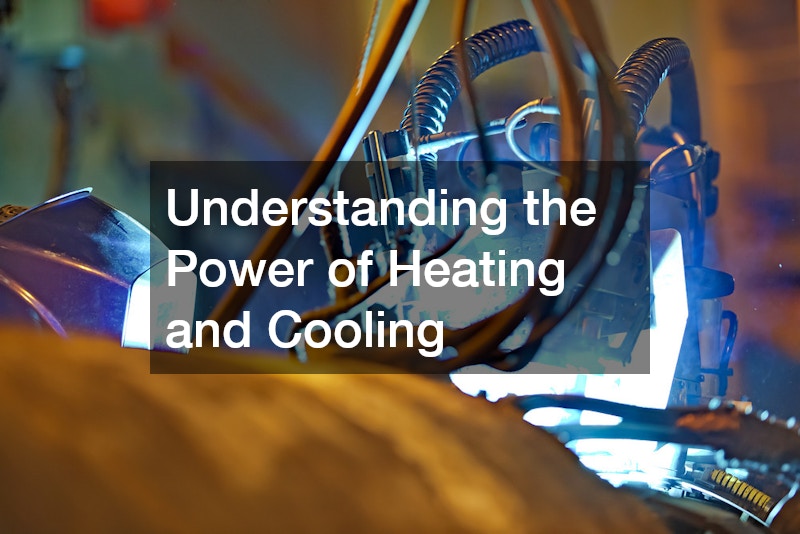

Heating and cooling systems are crucial components of modern living, ensuring comfort and livable conditions regardless of external weather. These systems not only influence the environment within our homes and workplaces but also have significant implications for energy consumption and health. Understanding the mechanisms behind heating and cooling can provide insights into improving efficiency and well-being.
How Does Heating and Cooling Impact Energy Efficiency?
The Role of Insulation
Insulation plays a vital role in maintaining the efficiency of heating and cooling systems by reducing heat loss in winter and heat gain in summer. Proper insulation allows homes to remain warmer in the cold and cooler in the heat, thereby reducing the need for excessive energy use.
This results not only in lower energy bills but also reduced strain on heating and cooling systems.
High-quality insulation materials, such as fiberglass or foam, create a barrier against external temperature fluctuations. Adequate insulation in walls, roofs, and floors decreases the demand on HVAC systems to maintain comfortable indoor temperatures. By minimizing energy loss, insulation contributes to both environmental and economic savings.
Investing in efficient insulation solutions can significantly boost a building’s energy performance. It is estimated that well-insulated homes can cut heating and cooling energy usage by up to 40 percent. Consequently, better insulation not only helps conserve financial resources but also supports broader environmental sustainability goals.
Smart Thermostats: A Game Changer
Smart thermostats have revolutionized the way homeowners manage heating and cooling, offering advanced features that facilitate energy efficiency. These devices allow users to remotely control their HVAC settings through smartphones, ensuring optimal temperatures are maintained without unnecessary energy expenditure. Smart thermostats learn user preferences over time, adapting to specific routines and enhancing comfort.
The use of smart thermostats can result in significant energy savings as they automatically adjust settings based on occupancy patterns. For instance, they can lower heating or cooling output when a home is unoccupied, thus minimizing waste. According to research, installing a smart thermostat can reduce heating and cooling bills by an average of 10–12%.
Moreover, smart thermostats contribute to environmental conservation by optimizing energy consumption. They also provide valuable insights into energy usage patterns, enabling users to make informed decisions about their energy habits. The convenience and efficiency of smart thermostats make them an invaluable tool for modern households striving for sustainability.
What are the Health Benefits of Proper Heating and Cooling?
Allergy and Asthma Management
Proper heating and cooling systems can play a significant role in managing allergies and asthma, as they help control air quality. By regulating the interior climate and filtering out airborne particles, such systems reduce the prevalence of triggers that can exacerbate these conditions. The right HVAC settings contribute to a healthier indoor environment, providing relief to susceptible individuals.
Regularly cleaned and maintained HVAC filters are essential for controlling allergens such as dust mites, pet dander, and pollen. Advanced filtration systems, like HEPA filters, are particularly effective in removing even the smallest particles, enhancing air quality. This proactive approach to managing air quality can help reduce the frequency of allergy and asthma attacks.
A well-functioning HVAC system also aids in maintaining appropriate humidity levels, further supporting respiratory health. By keeping humidity in check, it prevents the growth of mold and mildew, which can worsen allergy and asthma symptoms. Optimal indoor conditions, made possible through efficient heating and cooling, facilitate better respiratory health.
Regulating Humidity Levels
Proper heating and cooling systems are instrumental in regulating indoor humidity levels, which can greatly impact health and comfort. Maintaining ideal humidity reduces the risk of mold growth and dust mite proliferation, both of which are known to cause allergic reactions. Balanced humidity levels create a more pleasant environment, reducing skin irritation and respiratory issues.
Heating systems can often dry out indoor air, so using humidifiers in tandem can help achieve the desired moisture balance. Similarly, air conditioners remove excess moisture to prevent dampness and associated problems. Monitoring and adjusting humidity levels is essential for maintaining an indoor atmosphere conducive to well-being.
The role of heating and cooling systems goes beyond mere temperature control, impacting energy efficiency and health significantly. Players like insulation, smart thermostats, and high-performance HVAC systems contribute to sustainable energy use. Additionally, the health benefits of proper climate control, including improved allergy management, humidity regulation, and enhanced sleep quality, highlight the importance of investing in these systems for both comfort and wellbeing.



